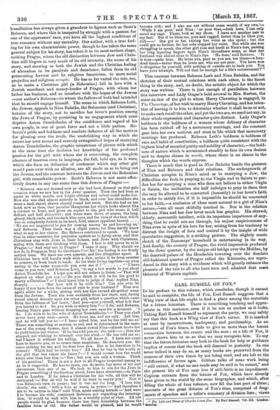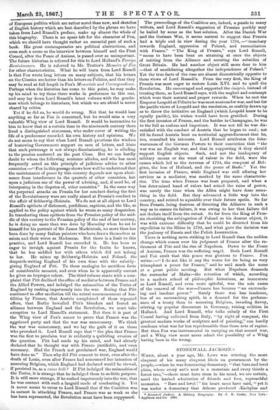EARL RUSSELL ON FOX.*
IN his preface to this volume, which concludes, though it cannot be said to complete, the life of Fox, Earl Russell suggests that a Whig view of that life ought to find a place among the materials for a future historian. There is something touching and appro- priate in this sentence, even if it be not as modest as it looks. Taking Earl Russell himself to represent the party, we may safely say that this book is a Whig view of Fox's career. It is markecl at once by incorrectness, inadequacy, and partizanship. As an account of Fox's times, it fails to give us more than the barest connection between the events and the man ; as a life of Fox, it never shows him to us so that we may recognize him. To say that the future historian may look to the book for help or guidance implies of course that the book will descend to posterity. In one sense indeed it may do so, as many books are preserved from the censure of their own times by not being read, and are left to the indifference of future ages. Gibbon talks of some work being "still extant, if what no one reads may be said to be extant," and the present life of Fox may live if still-birth is no impediment. Copious extracts from the letters of Fox, which have already been given to the viorld by the same biographer, and which, after filling the whole of four volumes, now fill the best part of three ; accounts of the great debates of Fox's time, composed of frag- ments of speeches and a teller's summary of division lists ; views * The Life and Times of Charles JAMS Fox. By Earl Russell. Vol. IIL London : Bentley. of European politics which are rather novel than new, and sketches of English history which are best described by the phrase we have taken from Lord Rieman's preface, make up almost the whole of this biography. There is no space left for the character of Fox, which we should have thought rather an essential part of such a book. His great contemporaries are political abstractions, and even such a scene as the interview between himself and the First C011fitili after the Peace of Amiens, is passed over as unimportant. The future historian is referred for this to Lord Holland's Foreign Reminiscences. He is referred to Mr. Trotter's Memoirs of Fox for other characteristics. What he will learn from Lord Russell is that Fox wrote long letters on many subjects, that his letters on the Classics are better than his letters on Politics, and that they may be read at fall length in Fox's Memorials and Correspondence. Perhaps when the historian has come to this point, he may make up his mind to try those three works in preference to this one, and may lay down Lord Russell's latest volume with the gentle- ness which belongs to historians, but which we are afraid is never shared by critics.
Yet if he did so, he would do wrong. Not that he would lose anything so far as Fox is concerned, but he would miss a very valuable Whig view of Lord Russell. It would be instructive to him to know that at a certain time in the nineteenth century there lived a distinguished statesman, who under cover of writing the life of a predecessor recorded his own history and opinions. We do not mean to say that when Lord Russell questions the wisdom of bestowing Government support on men of letters, and hints that such patronage is not always discriminating, he is alluding to the pension conferred on the poet Close. But we can hardly doubt to whom the following sentence alludes, and who has most frequently acted on this principle of judicious advice to other countries:—" Fox in this passage shows how well he understood that the maintenance of peace by this country depends not upon absti- nence from interference in the quarrels of other countries, but upon a judicious use of the powerof advising, and, if need be, of interposing in the disputes of, other countries." In the same way the perpetual attacks on Prussia for her conduct during the first of the Revolutionary wars are really aimed at Prussia's conduct in the affair of Schleswig-Holstein. We do not at all object to Lord Russell's epithets of dishonest, perfidious, captious, and the like, as applied to the policy against which he wrote so many despatches. In transferring those epithets from the Prussian policy of the mid- dle of this century to the Prussian policy of the end of last century, he is doing no more than was done by Macaulay when he sat to himself for his portrait of Sir James Mackintosh, no more than has been done by many Italian painters who have drawn themselves as saints and their wives as Madonnas. But there is a limit to this practice, and Lord Russell has exceeded it. He has been so eager to inveigh against Prussia for the faults he knows, that he has saddled her with others which did not belong to her. He mixes up Schleswig-Holstein and Poland, the despatch-writing England of his own time with the subsidy- giving England of Pitt. To these analogies he sacrifices facts of considerable moment, and even when he is apparently correct he gives an improper colour. The third volume starts with a com- plaint that Pitt declined the office of mediator between France and the Allied Powers, and indulged the animosities of the Tories of England by rushing impetuously into the war. Seeing that Pitt continued to offer mediation till the actual commencement of hos- tilities by France, that Austria complained of these repeated offers, that Burke bewailed Pitt's blunders and feared an alliance between England and the Revolution, we must take exception to Lord Russell's statement. But then it is part of the Whig view of Fox's career to prove that France was the aggrieved party and that the war was unnecessary. We think the war was unnecessary, and we lay the guilt of it on those who provoked it. Lord Russell says that " the plea that France was the first to proclaim war is evidently a quibbling evasion of the question. Pitt had made up his mind, and had already declared that he thought war with France justifiable, and even necessary. Had the French not proclaimed war, England would have done so." Then why did Pitt consent to treat, even after the death of Louis, even after France had announced her intention of annexing Belgium, which England had declared would be viewed, if persisted in, as a cases kW? If Pitt indulged the animosities of the Tories, it is strange that he indulged them to so little purpose. It is still more strange, if he rushed impetuously into the war, that he was content with such a languid mode of conducting it. Yet it never seems to occur to Lord Russell that if the Coalition was in earnest in attacking France, and France was as weak as she has been represented, the Revolution must have been suppressed. The proceedings of the Coalition are, indeed, a puzzle to many writers, and Lord Russell's suggestion of Prussian perfidy may be hailed by some as the best solution. After the Danish War and the German War, it seems natural to suggest that Prussia had a triple end in view during the year 1794,—" treachery towards England, oppression of Poland, and reconciliation with France." "The King of Prussia," says Lord Russell, "seems to have been bent on attaining at once the objects of retiring from the Alliance and securing the subsidies of Great Britain. He had another object still more dear to has —that of annihilating altogether the independence of Poland." Yet the true facts of the case are almost diametrically opposite to these views of Lord Russell's. From the very first, the King of Prussia was most eager to restore Louis XVL and to quell the Revolution. He encouraged and supported the emigre:a, instead of treating them, as Lord Russell says, with the neglect and contempt which were their natural and proper rewards. When he met the Emperor Leopold at Pillnitz he was most anxious for war, and but for the pacific views of Leopold and the resolution, so craftily drawn up as to throw the initiative on England (which Leopold knew to be equally pacific), his wishes would have been gratified. During the first invasion of France, and the battles in Champagne, he was to the full as zealous and impatient. It was not till he was dis- satisfied with the conduct of Austria that he began to cool ; not till he found Austria bent on territorial aggrandizement that he, too, consulted his interests. Lord Russell attributes the lake- warmness of the German Powers to their conviction that "the war was an English war, and that in supporting it they should support English objects. Such, and not the inadequacy of military means or the want of valour in the field, were the causes which led to the reverses of 1794, the conquest of Bel- gium, the loss of Holland, and the peace of Basle." Yet the first invasion of France, while England was still offering her services as a mediator, was marked by the same characteris- tics. The time when France was least prepared, and when a less determined band of rulers had seized the reins of power, was surely the time when the Allies might have done some- thing in the field. But they advanced a little way into the country, and retired to squabble over their future spoils. So far from Prussia .being desirous of directing the Alliance in such a way as to ensure its failure, it was owing to her that failure did not declare itself from the outset. So far from the King of Prus- sia cherishing the subjugation of Poland as his dearest object, it was with extreme difficulty that he could be diverted from his expedition to the Rhine in 1794, and what gave the decision was the jealousy of Russia and the Polish Insurrection.
There is nothing more striking in Lord Russell than the sudden change which comes over his judgment of France after the re- tirement of Pitt and the rise of Napoleon. Down to the Peace of Amiens, France was the suffering angel. Both Lord Russell and Fox exult that this peace was glorious to France. Fox writes :—" I do not like it any the worse for its being so very triumphant a peace for France," and he said much the same at a great public meeting. But when Napoleon demands the surrender of Malta—the retention of which, according to a modern school of philosophic historians, as inaccurate as Lord Russell, and even more spiteful, was the sole cause of the renewal of the war—France has become "an encroach- ing and insolent power." Surely there was less insolence, less of an encroaching spirit, in a demand for the perform- ance of a treaty than in annexing Belgium, invading Savoy, stirring up popular discontent in Germany, raising sedition in Holland. And Lord Russell, who talks calmly of the First Consul having collected from Italy, "by right of conquest, the greatest modern works of sculpture and of painting," can hardly condemn what was far less reprehensible than those acts of rapine. But then Fox was instrumental in carrying on that second war, and a Whig view must never admit the possibility of a Whig having been in the wrong.































 Previous page
Previous page